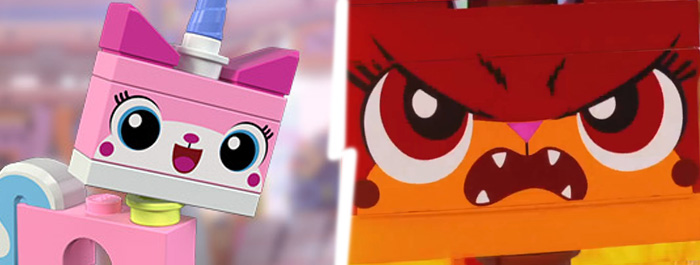Women are trained from a very young age to present themselves a certain way. Shall we say, an irrationally positive, put together, never upset sort of way. This isn’t just some weird rhetoric. Social science proves this theory time and time again. As media consumers, we see this play out in a variety of way. Two characters: the googly eyed love interest or the blanket bitch.

This singular dimension of emotional range means that as soon as we express anything beyond those feelings, we get cast as a psycho, freak, bitch or even worse things. That’s in real life and the movies, by the way.
Which brings me to a LEGO cat-unicorn hybrid. For months, I’ve been obsessed with Unikitty. I couldn’t really sort out why, though. For a while, I thought it was the cuteness factor multiplied by my undying love of LEGO. But upon further consideration, I think I’ve narrowed in on something rather more important.
Unikitty is the best comedic representation of the limited emotional range women are allowed to express in media and in their lives. Every time Unikitty feels something other than what is expected of her, she literally has to fight herself to repress her angry feelings by reinforcing the most silly stereotypes of the peppy female. Take 1:11 of this video as the perfect example of what I mean:
Some might say Unikitty is a stereotype, but I suggest she may be a subversive one. The LEGO Movie writers took the cliches of media about cloyingly happy women and literally just translated them into her actual lines. Just take a few common representations:
Representation: women must be happy and positive:
“Any idea is a good idea except the non-happy ones. Those we push down deep inside where you’ll never, ever, ever, EVER find them!”
Representation: women don’t know anything about business:
“Business, business, business. Numbers. Is this thing working?”
Representation: women must be peace keepers:
“You need to be more friendly!”
Representation: women are crazy:
Unikitty: “Here in Cloud Cuckoo Land, there are no rules: There’s no government, no baby sitters, no bedtimes, no frowny faces, no bushy mustaches, and no negativity of any kind.”
Lucy: “You just said the word "no” like a thousand times.“
Unikitty: "And there’s also no consistency.”
It’s completely unclear whether the writers were trying to be this deliberate in their use of Unikitty as a trope humor machine, but it works. And in her artistic form, she makes the reality of this “turn tropes into comedy” idea even further thanks to doe eyes when she’s giddy and a literal flaming body when she’s angry.
While I doubt a single child will pick up on any of this, as a grown women, I find it hilarious and necessary. If it takes an animated cat with a horn to point out just how stupid the representation of women has become, I’m all for it.
Reblog for the truth.